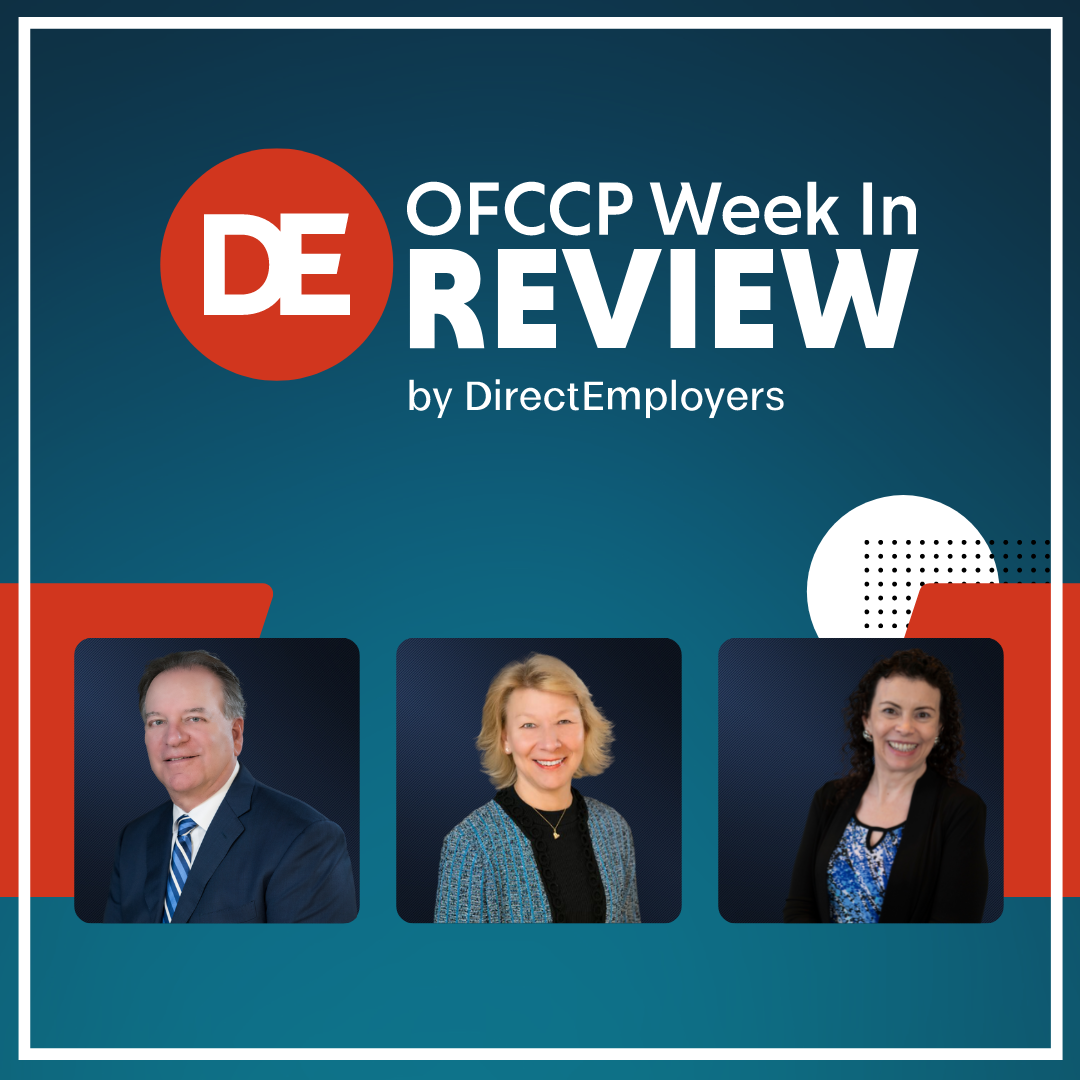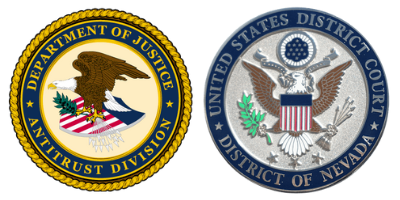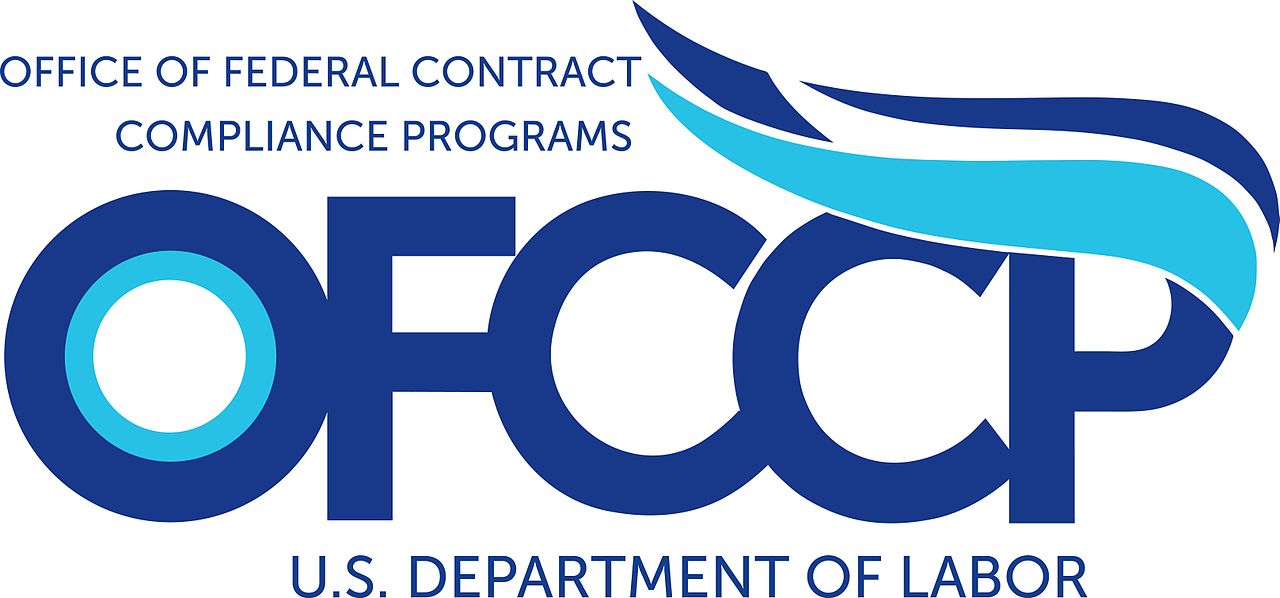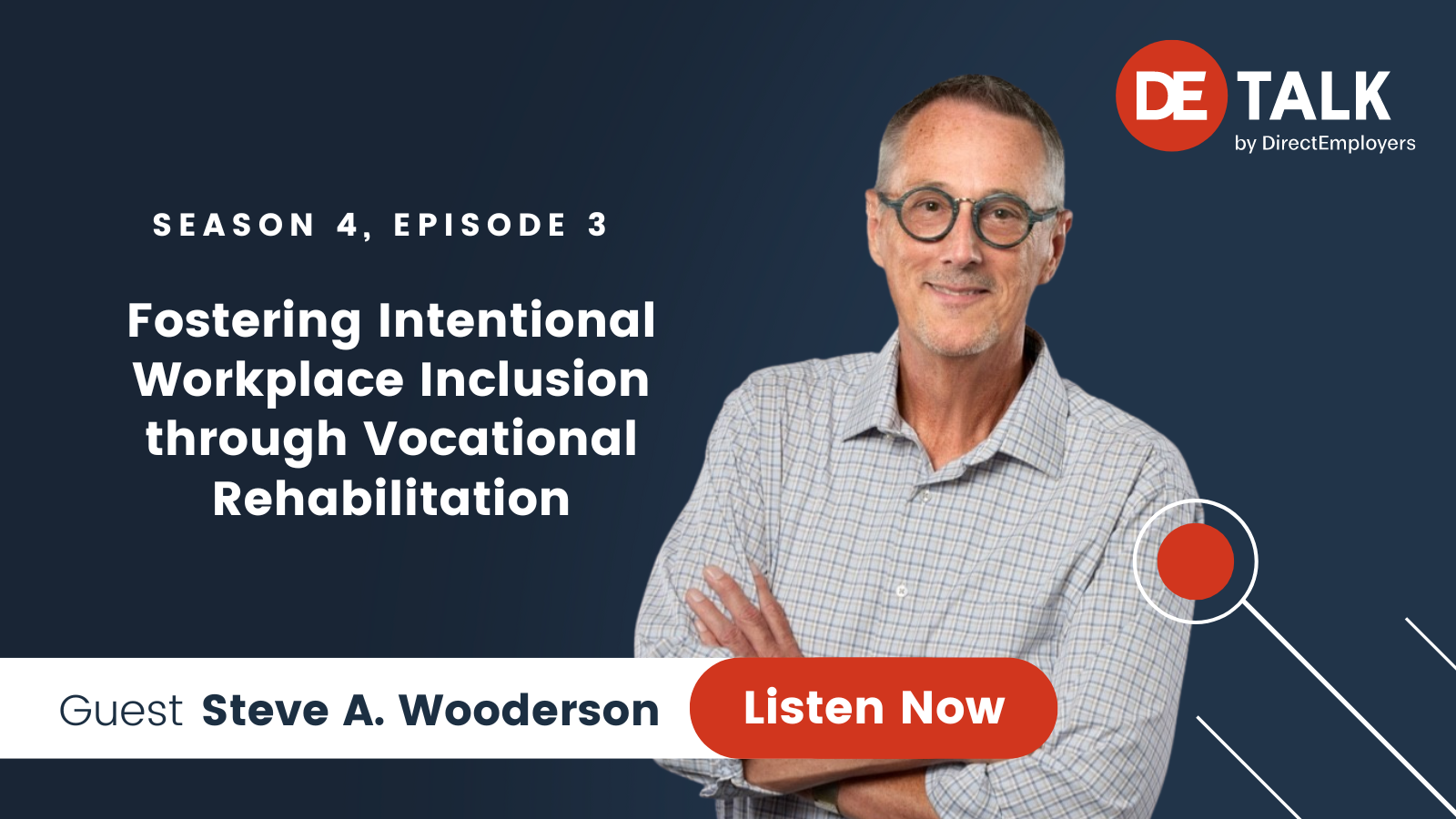 The DE OFCCP Week in Review (WIR) is a simple, fast and direct summary of relevant happenings in the OFCCP regulatory environment, authored by experts John C. Fox, Candee Chambers and Cynthia L. Hackerott. In today’s edition, they discuss:
The DE OFCCP Week in Review (WIR) is a simple, fast and direct summary of relevant happenings in the OFCCP regulatory environment, authored by experts John C. Fox, Candee Chambers and Cynthia L. Hackerott. In today’s edition, they discuss:
Tuesday, October 25, 2022: Fostering Intentional Workplace Inclusion through Vocational Rehabilitation Discussed in New DE Talk Podcast
In support of National Disability Employment Awareness Month, the latest edition of the DE Talk Podcast features DirectEmployers Disability & Community Outreach Specialist Christa Martin chatting with Council of State Administrators of Vocational Rehabilitation (CSAVR) CEO Steve Wooderson. Individuals with disabilities represent not only one of the most diverse protected classes in America but also one with the highest unemployment rate. How, as employers, can we work to shift the narrative to better employ and advance these talented individuals? Listen in as Christa Martin and Steve Wooderson talk about intentional inclusion through the use of vocational rehabilitation services. As a bonus, gain an insider’s perspective into how vocational rehab systems operate and what services employers can take advantage of today.
Listen to our DE Talk Podcast via any of the options below and subscribe to receive updates whenever a new podcast is available.
Apple • Spotify • Google • Stitcher • iHeartRadio • Stitcher • TuneIn • Overcast • Pocket Casts• Castro • Castbox • Podchaser • RSS Feed
…or your preferred Podcast provider
Thursday, October 27, 2022: U.S. Department of Justice Obtained First Successful Labor Market Criminal Antitrust Prosecution
USDOJ Reached Plea Agreement With Employer & Manager on Wage-Fixing & “No-Poach” Conspiracy Charges

According to the plea agreement, from about October 2016 until July 2017, VDA, through one of its regional managers, participated in a conspiracy with another contract healthcare staffing firm to suppress and eliminate competition by agreeing to not hire nurses from each other and fix the wages of those nurses. Earlier this year, a federal grand jury in Las Vegas, Nevada indicted VDA and the manager on the one-count felony charges of “Conspiracy in Restraint of Trade” in violation of the Sherman Act (15 U.S.C. Section 1).
Following the company’s guilty pleas, Judge Richard F. Boulware II of the U.S. District Court for the District of Nevada sentenced the company to pay a criminal fine of $62,000 and restitution of $72,000 to victim nurses. The individual manager was neither fined nor jailed. A violation of the Sherman Act carries a statutory maximum penalty of 10 years in prison and a $1 million fine for individuals and a maximum penalty of a $100 million fine for corporations. Courts may increase the maximum fine to twice the gain derived from the crime or twice the loss suffered by victims if either amount is greater than the statutory maximum.
How Did We Get Here?
In their joint October 2016 “Antitrust Guidance for Human Resource Professionals,” the USDOJ and Federal Trade Commission (FTC) detailed the type of employer actions that may lead to criminal charges. “An agreement among competing employers to limit or fix the terms of employment for potential hires may violate the antitrust laws if the agreement constrains individual firm decisionmaking with regard to wages, salaries, or benefits; terms of employment; or even job opportunities.”
“It is unlawful for competitors to expressly or implicitly agree not to compete with one another, even if they are motivated by a desire to reduce costs,” the 10-and-a-half-page document also cautions. The guidance further explains that an employer is “likely [] breaking the antitrust laws if it:
- agrees with individual(s) at another company about employee salary or other terms of compensation, either at a specific level or within a range (so-called wage-fixing agreements), or
- agrees with individual(s) at another company to refuse to solicit or hire that other company’s employees (so-called “no poaching” agreements).”
Employer Wage-Fixing & No-Poaching Agreements Are Illegal Even Without Competitive Effects
“Naked wage-fixing or no-poaching agreements among employers, whether entered into directly or through a third-party intermediary, are per se illegal under the antitrust laws,” the guidance points out. “That means that if the agreement is separate from or not reasonably necessary to a larger legitimate collaboration between the employers, the agreement is deemed illegal without any inquiry into its competitive effects.” Legitimate joint ventures, such as “appropriate” shared use of facilities are not considered per se illegal under the antitrust laws, the agencies explained.
Despite Setbacks, USDOJ and the U.S. Federal Trade Commission are Actively Pursuing Similar Cases
On April 14, a federal jury in Texas acquitted the former clinical director of a physical therapist staffing company of charges of wage-fixing. However, the jury convicted the owner of obstructing the FTC’s investigation. The following day, a federal jury in Colorado acquitted kidney dialysis company DaVita Inc and a former chief executive officer on DOJ “no-poach” charges alleging they conspired with three other companies not to hire each other’s senior-level employees.
Nevertheless, following these verdicts, Assistant Attorney General for the DOJ Antitrust Division Jonathan Kanter was not deterred, stating in an event in Chicago: “We’re going to continue to bring the cases — we’re not backing down.”
“Protecting workers from antitrust schemes – such as wage-fixing and employee allocation – remains a priority for the U.S. Attorney’s Office,” said U.S. Attorney Jason M. Frierson for the District of Nevada in a press statement on the VDA plea agreement. “We are committed to working with the Antitrust Division and FBI to prosecute anticompetitive conduct that affects opportunities for workers and the labor market.”
Reminder: Justice Department Inked Agreements on Antitrust With USDOL & NLRB
In March, we reported that “USDOL Signed MOU to Report to USDOJ Employers Pursuing ‘No-Poach’ Recruitment Agreements And/Or Conspiring to Fix Wages.” We also reported that in late July, the “NLRB and Justice Department Signed New Partnership Agreement To Focus on Antitrust.”
In Brief
Wednesday, October 26, 2022: USDOL Extended by 15 Days Comment Period on Independent Contractor Proposal

The WHD published its Notice of Proposed Rulemaking (NPRM) in the Federal Register on Thursday, October 13, 2022. We previously explained how the proposed Rule would apply a six-part “Totality of Circumstances” Test to determine whether a “worker” (neutral term) is an “employee” or an “ independent contractor” under the FLSA. Publication of the NPRM in the Federal Register started the comment period that the WHD extended, via another Federal Register notice, from 46 days to 61 days. The extension was also announced in an email to subscribers on Tuesday, one day prior to the Federal Register notice.
Friday, October 28, 2022: Catching Up With EEOC, OFCCP Has Now Posted Its New Employee Rights Poster
Contractors must still also post Pay Transparency Nondiscrimination Provision Poster

The updated OFCCP poster replaces both OFCCP’s 2009 “EEO is the Law” poster and its 2015 supplement – rolling them into the new single, revised (2-page) poster. Importantly, in addition to this updated “Know Your Rights” poster, “[f]ederal contractors are also still required to post the [separate] Pay Transparency Nondiscrimination Provision and include it in employee handbooks and manuals,” OFCCP said in its announcement. OFCCP regulations at § 60-1.35 (c) require the Pay Transparency Nondiscrimination Provision to be incorporated into employee handbooks and manuals in addition to posting the provision. OFCCP did not publish the new updated poster for Notice and Comment.
Bottom Line: OFCCP believes its Rules now require covered federal contractors to (immediately) post the two OFCCP-required posters – (1) the updated, 2-page “Know Your Rights” poster, which is exactly the same one that the EEOC posted on its website last week; and (2) the separate Pay Transparency Nondiscrimination Provision poster that OFCCP has required since September 2015. OFCCP’s webpage for the posting requirements contains both posters. “Covered federal contractors” ostensibly required to post the OFCCP’s “Know Your Rights” poster pursuant to OFCCP’s Executive Order 11246 Rules, and which are also “employers” Title VII covers, need not post the EEOC version of the poster (since both “Know Your Rights” posters contain identical language).
Even though OFCCP’s website has now caught up with the EEOC’s employee rights poster update, the DOL Workplace Posters webpage still has not been updated (as of the WIR deadline).
Looking Ahead:
Upcoming Date Reminders
Tuesday, November 1, 2022: Deadline to submit comments on US General Services Administration’s future rulemaking regarding union solicitations of federal contractor employees in GSA-controlled buildings – https://www.regulations.gov/docket/GSA-FMR-2022-0011
Thursday, November 3, 2022 (2:00 – 2:30 PM Eastern Time): DE Webinar – “Veteran Recruitment: Evolving Into a Veteran-Friendly Employer Brand”
Tuesday, November 8, 2022: Mid-Term Elections—TIME TO VOTE!
Thursday, November 10, 2022: (2:00 – 3:00 PM Eastern Time): DE Webinar – “How to Attract, Evaluate, Onboard and Retain Veteran Talent”
Thursday, November 17, 2022: (1:00 PM Eastern Time): OFCCP Webinar – “FAAP Directive 2013-01, Revision 3”
Friday, November 25, 2022: US DOL Final Rule rescinding Industry-Recognized Apprenticeship Programs and shifting department resources to Registered Apprenticeship Programs takes effect – http://www.federalregister.gov/d/2022-20560
Wednesday, November 30, 2022: (2:00 – 3:00 PM Eastern Time): DE Webinar – Third in DE’s Pay Transparency Laws Series: “Who Has the Right to Talk? Discussing the Laws Promoting Employee Rights to Pay Transparency”
Wednesday, December 7, 2022: Deadline to submit initial comments on NLRB’s proposed Rule to Determine Joint Employer Status (previous November 7 deadline extended) – https://www.regulations.gov/docket/NLRB-2022-0001
Tuesday, December 13, 2022: Comments due on USDOL WHD proposed rule on “Employee or Independent Contractor Classification Under the Fair Labor Standards Act” (previous November 28 deadline extended) – https://www.regulations.gov/docket/WHD-2022-0003
Wednesday, December 21, 2022: Deadline to submit reply comments in response to initial comments on NLRB’s NPRM to Determine Joint Employer Status (previous November 21 deadline extended) – https://www.regulations.gov/docket/NLRB-2022-0001
Sunday, January 1, 2023: The minimum wage for federal contracts covered by Executive Order 13658 (“Establishing a Minimum Wage for Contractors”) (contracts entered into, renewed, or extended prior to January 30, 2022), will increase to $12.15 per hour, and the minimum cash wage for tipped employees increases to $8.50 per hour – https://www.federalregister.gov/documents/2022/09/30/2022-20905/minimum-wage-for-federal-contracts-covered-by-executive-order-13658-notice-of-rate-change-in-effect
Sunday, January 1, 2023: The minimum wage for federal contractors covered by Executive Order 14026 (“Increasing the Minimum Wage for Federal Contractors”) (contracts entered into on or after January 30, 2022, or that are renewed or extended on or after January 30, 2022), will increase to $16.20 per hour, and the minimum cash wage for tipped employees increases to $13.75 per hour – https://www.federalregister.gov/documents/2022/09/30/2022-20906/minimum-wage-for-federal-contracts-covered-by-executive-order-14026-notice-of-rate-change-in-effect
Wednesday, April 12 – Friday, April 14, 2023: DEAMcon23 Chicago (Registrations open now; Agenda coming soon!)
THIS COLUMN IS MEANT TO ASSIST IN A GENERAL UNDERSTANDING OF THE CURRENT LAW AND PRACTICE RELATING TO OFCCP. IT IS NOT TO BE REGARDED AS LEGAL ADVICE. COMPANIES OR INDIVIDUALS WITH PARTICULAR QUESTIONS SHOULD SEEK ADVICE OF COUNSEL.
SUBSCRIBE.
Compliance Alerts
Compliance Tips
Week In Review (WIR)
Subscribe to receive alerts, news and updates on all things related to OFCCP compliance as it applies to federal contractors.
OFCCP Compliance Text Alerts
Get OFCCP compliance alerts on your cell phone. Text the word compliance to 55678 and confirm your subscription. Provider message and data rates may apply.


